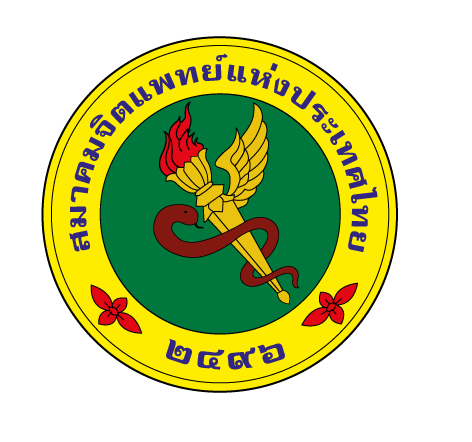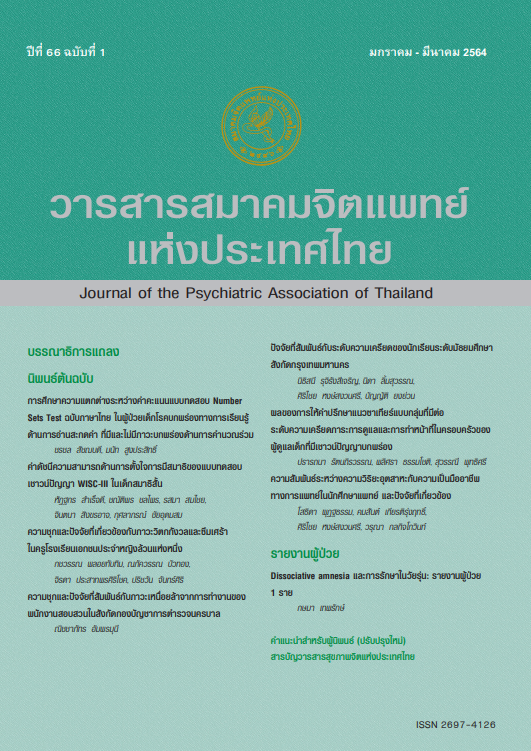ผลของการให้คำปรึกษาแนวซาเทียร์แบบกลุ่มที่มีต่อระดับความเครียด ภาระการดูแลและการทำหน้าที่ในครอบครัวของผู้ดูแลเด็กที่มีเชาวน์ปัญญาบกพร่อง
Main Article Content
บทคัดย่อ
วัตถุประสงค์ เพื่อศึกษาผลของการให้คำปรึกษาแนวซาเทียร์แบบกลุ่ม และเพื่อเปรียบเทียบความเครียด ภาระการดูแล และการทำหน้าที่ในครอบครัวของผู้ดูแลเด็กที่มีเชาวน์ปัญญาบกพร่องก่อนและหลังเข้าร่วมโปรแกรม
วิธีการศึกษา กลุ่มตัวอย่างเป็นผู้ดูแลเด็กที่มีเชาวน์ปัญญาบกพร่อง โดยคัดเลือกแบบเฉพาะเจาะจง แบ่งเป็นกลุ่มทดลอง 21 คน และกลุ่มควบคุม 26 คน รวม 47 คน กลุ่มทดลองเข้าร่วมโปรแกรมการให้คำปรึกษาแนวซาเทียร์แบบกลุ่ม จำนวน 8 ครั้ง ครั้งละ 90-120 นาที สัปดาห์ละ 1 ครั้ง ส่วนกลุ่มควบคุมจะได้รับบริการปกติ ประเมินก่อนและหลังการทดลองด้วยแบบประเมินและวิเคราะห์ความเครียดด้วยตนเองของกรมสุขภาพจิต แบบประเมินภาระการดูแล (Zarit Burden) ฉบับภาษาไทย 12 ข้อ และแบบประเมินการทำหน้าที่ในครอบครัว (Score-15) วิเคราะห์ข้อมูลโดยใช้สถิตเชิงพรรณนา สถิติไคสแควร์ และสถิติค่าที
ผลการศึกษา พบว่า ผู้ดูแลเด็กที่มีเชาวน์ปัญญาบกพร่องที่เป็นกลุ่มทดลอง มีคะแนนค่าเฉลี่ยความเครียด ภาระการดูแลและการทำหน้าที่ในครอบครัว หลังเข้าโปรแกรมการให้คำปรึกษาแนวซาเทียร์แบบกลุ่มลดลงน้อยกว่าก่อนเข้าโปรแกรมอย่างมีนัยสำคัญทางสถิติ ที่ระดับ .05 และเมื่อเปรียบเทียบคะแนนค่าเฉลี่ยความเครียด ภาระการดูแล และการทำหน้าที่ในครอบครัวระหว่างกลุ่มทดลองและกลุ่มควบคุม หลังเข้าร่วมโปรแกรม พบว่า คะแนนค่าเฉลี่ยความเครียดและภาระการดูแลของกลุ่มทดลองน้อยกว่ากลุ่มควบคุมอย่างมีนัยสำคัญทางสถิติที่ระดับ .05 ส่วนคะแนนค่าเฉลี่ยการทำหน้าที่ในครอบครัวของกลุ่มทดลองและกลุ่มควบคุมไม่แตกต่างกัน
สรุป การให้การปรึกษาแนวซาเทียร์แบบกลุ่มอาจมีผลทางบวกต่อความเครียด ภาระการดูแล และการทำหน้าที่ในครอบครัวผู้ดูแลเด็กเชาวน์ปัญญาบกพร่อง
คำสำคัญ: การให้คำปรึกษาแนวซาเทียร์แบบกลุ่ม, ผู้ดูแลเด็กที่มีเชาวน์ปัญญาบกพร่อง
Article Details
บทความที่ส่งมาเพื่อพิจารณา ต้องไม่เคยตีพิมพ์หรือได้รับการตอบรับให้ตีพิมพ์ในวารสารฉบับอื่น และต้องไม่อยู่ระหว่างการส่งไปพิจารณาในวารสารอื่น
เอกสารอ้างอิง
2. Rajanukul Institute.org(Internet).Bangkok: Intellectual Disability. Available from:https://www.rajanukul.ac.th/.
3. Miodrag N, Hodapp RM. Chronic stress and health among parents of children with intellectual and developmental disabilities. Curr Opin Psychiatry. 2010;23(5):407-11.
4. Jackson JB, Steward SR, Roper SO, Muruthi BA. Support Group Value and Design for Parents of Children with Severe or Profound Intellectual and Developmental Disabilities. J Autism Dev Disord;2018.
5. Kampangkeaw N. Effectiveness of family therapy for mentally deficient persons in accordance with Satir approach. Bangkok: Thammasat University; 2011.
6. Kamkliang K, editor Prototype development : Satir model in parents group of attention deficit and hyperactivity disorders children;2012.
7. Sanitlou N. SAMPLE SIZE CALCULATION USING G*POWER PROGRAM. Suvarnabhumi Institute of Technology. 2019;5:496-507.
8. Chakrabhan S. Development of Thai computerized self-analysis stress test. Nonthaburi: Department of Mental Health,Thailand; 1999. p.93.
9. Silpakit O, Silpakit C, Chomchuen R, editors. Psychometric study of the Thai version of Zarit Burden Interview in psychiatric caregivers;2015.
10. Limsuwan N, Prachason T. The reliability and validity of the 15-item Systemic Clinical Outcome and Routine Evaluation (SCORE-15) Thai version. 2020;42(1):119-28.
11. Khumsabanant S. Family Group Therapy based on Satir Model. Bangkok: Thammasat University; 2018.
12. Hsiao Y-J. Parental Stress in Families of Children With Disabilities. Intervention in School and Clinic. 2017:105345121771295.
13. Hastings RP, Beck A. Practitioner Review: Stress intervention for parents of children with intellectual disabilities. Journal of Child Psychology and Psychiatry. 2004;45(8):1338-49.
14. Dyson LL. Fathers and Mothers of School-Age Children With Developmental Disabilities: Parental Stress, Family Functioning, and Social Support. American Journal on Mental Retardation. 1997;102(3):267.


